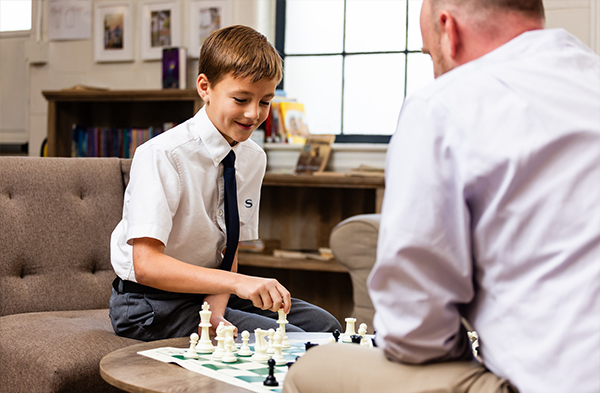 Cultivating truth, goodness, and beauty grounded in the Christian worldview
Cultivating truth, goodness, and beauty grounded in the Christian worldviewAt the heart of classical education is the idea that we ought to teach with the grain of a child...
The scope and sequence to Stonehaven's curriculum follows a distinct classical Christian model. The primary goals to this curriculum design include integration of disciplines, a liberal arts focus, and alignment with the developmental phases of the Trivium. The Lower School Curriculum seeks to leverage the natural curiosity and wonder in young children by equipping them with the knowledge they need to be prepared for the Logic and Rhetoric school.
The Poll-Parrot stage is the one in which learning by heart is easy and, on the whole, pleasurable; whereas reasoning is difficult and, on the whole, little relished. At this age, one readily memorizes the shapes and appearances of things; one likes to recite the number-plates of cars; one rejoices in the chanting of rhymes and the rumble and thunder of unintelligible polysyllables; one enjoys the mere accumulation of things.
Latin should be begun as early as possible--at a time when inflected speech seems no more astonishing than any other phenomenon in an astonishing world; and when the chanting of "Amo, amas, amat" is as ritually agreeable to the feelings as the chanting of "eeny, meeny, miney, moe."
In English, meanwhile, verse and prose can be learned by heart, and the pupil's memory should be stored with stories of every kind--classical myth, European legend, and so forth.
The grammar of History should consist, I think, of dates, events, anecdotes, and personalities. A set of dates to which one can peg all later historical knowledge is of enormous help later on in establishing the perspective of history.
Geography will similarly be presented in its factual aspect, with maps, natural features, and visual presentment of customs, costumes, flora, fauna, and so on; and I believe myself that the discredited and old-fashioned memorizing of a few capitol cities, rivers, mountain ranges, etc., does no harm. Stamp collecting may be encouraged.
Science, in the Poll-Parrot period, arranges itself naturally and easily around collections--the identifying and naming of specimens and, in general, the kind of thing that used to be called "natural philosophy."
The grammar of Mathematics begins, of course, with the multiplication table, which, if not learnt now, will never be learnt with pleasure; and with the recognition of geometrical shapes and the grouping of numbers. These exercises lead naturally to the doing of simple sums in arithmetic.
Observation and memory are the faculties most lively at this period.
Recitation aloud should be practiced, individually or in chorus; for we must not forget that we are laying the groundwork for Disputation and Rhetoric.
"Without education, we are in a horrible and deadly danger of taking educated people seriously." - G.K. Chesterton
